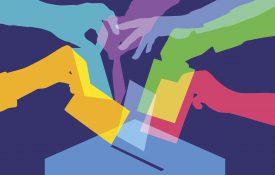-

People Rationalize Policies as Soon as They Take Effect
Findings from three field studies indicate that people report more favorable opinions about policies and politicians once they become the status quo. Visit Page
-

The Bias Beneath: Two Decades of Measuring Implicit Associations
Since its debut in 1998, an online test has allowed people to discover prejudices that lurk beneath their awareness — attitudes that researchers wouldn’t be able to identify through participant self-reports. The Observer examines the findings generated by the Implicit Association Test over the past 20 years. Visit Page
-
LIBERALS AREN’T AS DIVIDED AS THEY THINK
Pacific Standard: Despite the unpopularity of President Donald Trump and the Republican Congress, Democrats are fretting about the 2018 elections. Can “I’m with her” moderates and Bernie Sanders-supporting leftists join forces? Or will the party be torn Visit Page
-
THE SUBTLE BIAS THAT UNDERLIES OUR IDEOLOGICAL LEANINGS
Pacific Standard: There are many theories as to why someone grows up to be a liberal or a conservative. These range from psychological (liberals tend to be more open to ambiguity) to developmental (authoritarian parents tend to Visit Page
-
Why Liberals Aren’t as Tolerant as They Think
Politico: In March, students at Middlebury College disrupted a lecture by the conservative political scientist Charles Murray because they disagreed with some of his writings. Last month, the University of California, Berkeley, canceled a lecture Visit Page
-

Hitting the Streets for Science: What Motivates Protest Behavior?
This past weekend tens of thousands of people participated in science marches in more than 600 cities around the world. Scientists on all seven continents — even Antarctica – participated in the protest. At a Visit Page

